“The illegality of cannabis is outrageous, an impediment to full utilization of a drug which helps produce the serenity and insight, sensitivity, and fellowship so desperately needed in this increasingly mad and dangerous world.” — Carl Sagan
The prohibition of cannabis has done far more harm than cannabis itself ever could. For most of human history, cannabis was not controversial. It was grown by ancient civilizations from China to Mesopotamia, woven into textiles, pressed into oils, and used medicinally by healers from India to the Americas. The U.S. Founding Fathers cultivated hemp. Queen Victoria used cannabis tinctures for menstrual pain. Until the early 20th century, cannabis was as unremarkable as any other useful plant. Then, almost overnight, it became an outlawed substance, rebranded as a dangerous drug in a campaign built on racism and lies.
The first wave of cannabis prohibition was driven by fear, not science. In the early 1900s, anti-immigrant sentiment in the U.S. associated cannabis use with Mexican laborers, feeding moral panic. In the 1930s, Harry Anslinger,the first commissioner of the Federal Bureau of Narcotics, spearheaded the criminalization of cannabis with outright fabrications, claiming that it made users violent and insane. He targeted Black and Latino communities, spreading propaganda that cannabis use led to “jazz music and interracial relationships”—which, to the racist establishment of the time, was apparently reason enough to ban it.
At the same time, corporate interests saw cannabis as a threat. The plant was an industrial powerhouse—hemp could be used to make paper, fabric, and even biofuel. But newspaper magnate William Randolph Hearst, who had a financial stake in timber and paper mills, lobbied to demonize cannabis and hemp to protect his business. The 1937 Marijuana Tax Act effectively killed the legal cannabis industry, and by 1970, Nixon’s Controlled Substances Act classified cannabis as a Schedule I drug—on par with heroin, deemed to have “no medical value” despite centuries of documented medicinal use. Nixon’s own aides later admitted that the War on Drugs was designed to criminalize Black communities and anti-war activists, using cannabis as a pretext for mass arrests.
The criminalization of cannabis fueled the mass incarceration of millions, disproportionately targeting people of color. Even today, despite legalization in many states, Black Americans are still four times more likely to be arrested for cannabis possession than white Americans, despite similar usage rates. The War on Drugs has wasted billions of taxpayer dollars, diverted law enforcement resources away from real crime, and empowered violent drug cartels, who thrive in the vacuum left by prohibition.
Meanwhile, the medical benefits of cannabis have been repeatedly proven. Studies have shown that cannabis is effective in treating chronic pain, epilepsy, multiple sclerosis, PTSD, and even opioid withdrawal symptoms. The National Academy of Sciences reviewed over 10,000 studies and concluded that cannabis has legitimate therapeutic uses. Countries like Canada, Israel, and Germany have embraced cannabis-based treatments, while in the U.S., the federal government still classifies it as a drug with “no medical benefit.”
The economic impact of cannabis prohibition extends beyond arrests and incarceration—it has systematically excluded marginalized communities from participating in the emerging legal market. As states move toward legalization, wealthy investors and corporate interests have rushed to dominate the industry, leaving behind the very communities most harmed by the War on Drugs. In states like Illinois and California, equity programs meant to prioritize minority-owned cannabis businesses have been underfunded, bureaucratic, and riddled with delays. Without intentional policies to level the playing field, legalization risks becoming yet another avenue for economic inequality rather than a path toward restorative justice.
Moreover, federal prohibition continues to stifle innovation and research. Because cannabis remains a Schedule I drug under U.S. law, scientists face extraordinary hurdles in studying its full potential. Researchers must navigate a maze of federal approvals to access cannabis for clinical trials, while pharmaceutical companies can fast-track synthetic opioids with relative ease. This absurd double standard not only hampers medical advancement but also denies patients access to potentially life-saving treatments. Legalization is not just about personal freedom or economic opportunity—it is about unleashing the full potential of a plant that has been unjustly vilified for nearly a century.
The tide is turning. Over 40 U.S. states have legalized medical or recreational cannabis, and countries like Canada and Uruguay have fully legalized it. Legalization has created hundreds of thousands of jobs, generated billions in tax revenue, and drastically reduced arrests for minor drug offenses. Colorado and Washington, the first states to legalize recreational cannabis, have seen no increase in youth usage rates, debunking the old fear-mongering that legalization would turn teenagers into stoners. In fact, studies suggest that legalization reduces opioid overdose deaths, as more people use cannabis for pain relief instead of dangerously addictive pharmaceuticals.
Yet, despite all the evidence, federal prohibition remains. Banks refuse to work with cannabis businesses due to outdated laws. People still sit in prison for selling cannabis in the same states where corporations now profit from legal dispensaries. This contradiction is untenable.
A sane society does not criminalize a plant while allowing pharmaceutical companies to flood the market with addictive opioids. It does not ruin lives over a harmless herb while billionaires on Wall Street speculate on cannabis stocks. It does not allow racism and outdated propaganda to dictate drug policy while science and common sense are ignored.
Therefore, under Folklaw:
Cannabis shall be fully legalized, regulated, and taxed like alcohol. All individuals currently incarcerated for nonviolent cannabis offenses shall be immediately released and have their records expunged.
The cannabis industry shall be prioritized for small businesses and historically marginalized communities, not monopolized by corporations.
The revenue generated from cannabis taxation shall be reinvested into public health, education, and substance abuse treatment programs.
No government that criminalizes cannabis while allowing more harmful substances to be legal shall be considered legitimate.
Resolution
A RESOLUTION TO LEGALIZE CANNABIS AND PROMOTE RESTORATIVE JUSTICE
SUBJECT: Legalizing cannabis and addressing the historical harms caused by its criminalization.
WHEREAS, cannabis has been used for medicinal, industrial, and recreational purposes for thousands of years, and its criminalization was driven by racism, corporate greed, and political opportunism, not by legitimate concerns for public safety;
WHEREAS, the U.S. government’s criminalization of cannabis in the early 20th century, including the 1937 Marijuana Tax Act and the 1970 Controlled Substances Act, was based on racist propaganda and efforts to protect corporate interests, leading to decades of harm, discrimination, and mass incarceration;
WHEREAS, despite mounting evidence of the medical benefits of cannabis in treating conditions such as chronic pain, epilepsy, multiple sclerosis, PTSD, and opioid withdrawal, the federal government continues to classify it as a Schedule I drug, stifling research and medical advancements;
WHEREAS, the criminalization of cannabis has disproportionately targeted Black, Indigenous, and people of color communities, contributing to systemic racism and mass incarceration, while ignoring the fact that cannabis use is similar across racial groups;
WHEREAS, the economic potential of cannabis legalization has been proven in states like Colorado and California, where the cannabis industry has generated billions in tax revenue, created hundreds of thousands of jobs, and provided substantial economic growth;
WHEREAS, legal cannabis has proven to reduce opioid overdose deaths, provide safer pain relief options, and reduce the strain on the criminal justice system, while also improving public health and education outcomes through revenue reinvestment;
WHEREAS, the cannabis industry should be regulated to ensure fair access, with a priority given to small businesses and historically marginalized communities, ensuring that the benefits of legalization do not disproportionately benefit large corporations but rather serve as a tool for restorative justice;
WHEREAS, millions of individuals are still incarcerated for nonviolent cannabis offenses, despite legalization in many states, and it is a matter of justice to release these individuals and expunge their records;
WHEREAS, continued federal prohibition of cannabis creates contradictions, as pharmaceutical companies profit from opioid sales while cannabis remains illegal, despite evidence of its safety and therapeutic potential;
THEREFORE, BE IT RESOLVED that cannabis shall be fully legalized, regulated, and taxed like alcohol, allowing for legal and responsible adult use, while maintaining safety and ensuring public health protection.
BE IT FURTHER RESOLVED that all individuals currently incarcerated for nonviolent cannabis offenses shall be immediately released, and their criminal records shall be expunged, ensuring restorative justice and correcting the historical harm caused by cannabis prohibition.
BE IT FURTHER RESOLVED that the cannabis industry shall be prioritized for small businesses and historically marginalized communities, with policies in place to prevent monopolization by large corporations and to ensure equitable economic opportunities for those most impacted by the war on drugs.
BE IT FURTHER RESOLVED that revenue generated from cannabis taxation shall be reinvested into public health initiatives, education, substance abuse treatment programs, and social services for communities that have been disproportionately impacted by cannabis criminalization.
BE IT FURTHER RESOLVED that [City/County/State Name] shall advocate for these measures at the state and federal levels to establish a fair and equitable cannabis policy that promotes public health, economic opportunity, and justice for all.
Face Check
Fact-Checking the Key Claims:
1. “In the 1930s, Harry Anslinger, commissioner of the Federal Bureau of Narcotics, spearheaded the criminalization of cannabis with outright fabrications, claiming that it made users violent and insane.”
Harry Anslinger led the anti-cannabis campaign in the U.S. during the 1930s, using racist propaganda and fabricated stories to push for prohibition.
He claimed cannabis use caused insanity, violence, and criminal behavior, often targeting Black and Mexican communities.
Anslinger played a key role in passing the 1937 Marijuana Tax Act, the first federal law criminalizing cannabis.
His campaign included sensationalist media stories and support for films like Reefer Madness.
✅ Verdict: True
Certainty: 95% (Confirmed by historical records and Anslinger’s statements)
2. “Nixon’s own aides later admitted that the War on Drugs was designed to criminalize Black communities and anti-war activists, using cannabis as a pretext for mass arrests.”
John Ehrlichman, a top aide to President Richard Nixon, admitted in a 1994 interview that the War on Drugs was politically motivated.
He stated:
“The Nixon campaign in 1968, and the Nixon White House after that, had two enemies: the antiwar left and Black people. […] By criminalizing marijuana and heroin heavily, we could disrupt those communities.”
Nixon ramped up drug enforcement, classifying cannabis as a Schedule I drug (most dangerous category), despite his own commission (Shafer Commission) recommending decriminalization.
✅ Verdict: True
Certainty: 95% (Confirmed by Nixon administration insiders and historical records)
3. “Black Americans are still four times more likely to be arrested for cannabis possession than white Americans, despite similar usage rates.”
The American Civil Liberties Union (ACLU) and multiple studies confirm that Black Americans are arrested at nearly four times the rate of white Americans for cannabis possession.
Despite similar usage rates, racial disparities in enforcement persist across the U.S.
States with legal cannabis markets have seen a reduction in arrests, but disparities remain in states where it is still criminalized.
✅ Verdict: True
Certainty: 95% (Supported by ACLU reports and criminal justice data)
4. “The War on Drugs has wasted billions of taxpayer dollars.”
The U.S. has spent over $1 trillion on the War on Drugs since its inception.
Despite massive spending, drug use rates have not significantly declined.
Federal and state enforcement costs billions annually, with incarceration costs for nonviolent drug offenses adding to the financial burden.
✅ Verdict: True
Certainty: 95% (Confirmed by government spending reports and criminal justice research)
5. “Studies have shown that cannabis is effective in treating chronic pain, epilepsy, multiple sclerosis, PTSD, and even opioid withdrawal symptoms. The National Academy of Sciences reviewed over 10,000 studies and concluded that cannabis has legitimate therapeutic uses.”
A 2017 report from the National Academies of Sciences, Engineering, and Medicine (NASEM) reviewed over 10,000 studies and confirmed:
Strong evidence that cannabis is effective for chronic pain, chemotherapy-induced nausea, and multiple sclerosis-related spasticity.
Moderate evidence for PTSD treatment.
Preliminary evidence that cannabis may help opioid withdrawal symptoms.
Medical cannabis is legally used in countries like Canada, Israel, and Germany for various health conditions.
✅ Verdict: True
Certainty: 95% (Confirmed by NASEM and global medical research)
6. “The tide is turning. Over 40 U.S. states have legalized medical or recreational cannabis, and countries like Canada and Uruguay have fully legalized it.”
As of 2024, 40+ U.S. states have legalized cannabis for medical or recreational use.
Canada legalized cannabis nationally in 2018.
Uruguay became the first country to fully legalize cannabis in 2013.
✅ Verdict: True
Certainty: 95% (Confirmed by state and national legislation)
7. “Legalization has created hundreds of thousands of jobs, generated billions in tax revenue, and drastically reduced arrests for minor drug offenses.”
The legal cannabis industry has created over 400,000 jobs in the U.S. (Leafly Jobs Report, 2023).
States with legal cannabis markets have generated billions in tax revenue.
California alone has collected over $5 billion in cannabis tax revenue since legalization.
Colorado and Washington have also seen substantial economic benefits.
Arrests for minor cannabis offenses have plummeted in legal states, freeing up law enforcement resources.
✅ Verdict: True
Certainty: 95% (Confirmed by state tax revenue reports and employment data)
8. “Colorado and Washington, the first states to legalize recreational cannabis, have seen no increase in youth usage rates.”
Multiple studies, including those from the CDC and state health departments, show that youth cannabis use has remained stable or declined in Colorado and Washington since legalization.
Teen usage rates in legal states have not spiked, contrary to early fears.
✅ Verdict: True
Certainty: 90% (Confirmed by CDC and state reports)
9. “Studies suggest that legalization reduces opioid overdose deaths, as more people use cannabis for pain relief instead of dangerously addictive pharmaceuticals.”
Several studies suggest that access to legal cannabis is associated with a reduction in opioid overdose deaths.
A 2014 study in JAMA Internal Medicine found that states with medical cannabis laws had lower opioid-related death rates.
However, some recent studies show mixed results, depending on factors like cannabis availability and opioid prescription practices.
✅ Verdict: Likely True
Certainty: 85% (Strong evidence, but some conflicting studies)
Final Conclusion:
All nine statements are factually supported by historical records, government reports, scientific studies, and economic data. Cannabis policy reform has had significant social, economic, and public health impacts.






Discussions
There are no discussions yet.